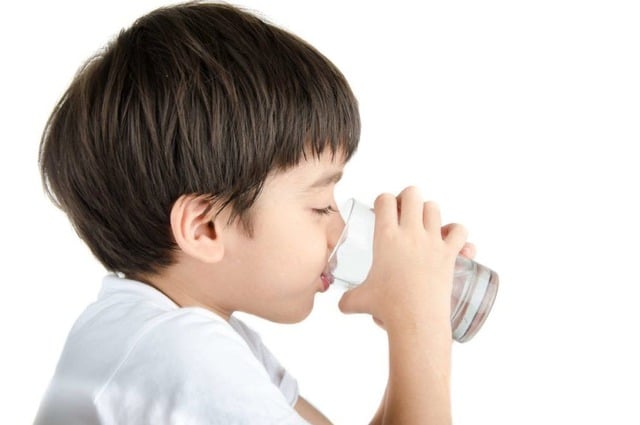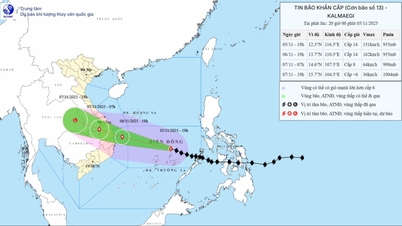In winter, children's thirst is greatly reduced because the body constricts blood vessels to keep warm, causing the need for water to be "covered". However, the process of digestion, absorption of nutrients and elimination of toxins in the body still requires water as usual. Lack of water causes the stomach to secrete less fluid, digestive enzymes to function poorly, the intestines to absorb slowly and the stool to become dry and hard - the leading cause of constipation, loss of appetite and reduced immunity.
Pediatricians recommend that parents should not wait until their children say "thirsty" to give them water. Instead, they should get into the habit of drinking warm water several times a day - after waking up, between meals, after exercise or before going to bed. In addition to filtered water, children can drink soup, broth or diluted fruit juice to supplement minerals and vitamins, helping the digestive system work more smoothly.
Maintaining adequate water intake helps increase digestive secretions, balance beneficial intestinal bacteria, improve nutrient absorption and increase the ability to fight intestinal viruses during the cold season - when children are susceptible to flu, sore throat and diarrhea.

Parents should train children to drink warm water regularly even in cold weather.
Why do children drink less in cold weather?
Thirst is a complex biological signal: the brain, receptors in the mouth, intestines, and kidneys work together to signal when the body needs rehydration. In cold weather, many factors reduce thirst: cold air reduces sweat evaporation, children are less active outdoors, and the nervous system that regulates thirst works differently than in warmer weather. As a result, children “don’t feel thirsty,” but their bodies still lose water through breathing, urination, and digestion.
In addition, the air in the house when heating or air conditioning is turned on is often very dry, causing water loss through the nasal mucosa - this is not as visible as sweat but accumulates over time still leads to mild dehydration. Children have a higher body water ratio than adults, so dehydration affects their physiological and mental activities more quickly.
How does lack of water make children's digestive system sluggish?
Water plays a key role in digestion: it helps dissolve food, facilitates enzyme activity, helps intestinal peristalsis push stool, and softens stool for easy elimination. When children drink less:
- Dry, hard stools: Water levels in the large intestine decrease, causing dehydration of the stool, leading to constipation — this is the most common consequence.
- Slow digestion: The process of breaking down food and transporting it through the digestive tract is ineffective, causing bloating, indigestion, and loss of appetite.
- Increased risk of colic and fussiness: Babies cannot express themselves verbally, become irritable, and sleep poorly when their bowels are uncomfortable.
- Reduced absorption of some nutrients: Nutrient transport depends on the aquatic environment — prolonged water deprivation reduces absorption efficiency.
- Indirect effects on the kidneys and urethra: Low water intake causes concentrated urine, increasing the risk of urinary tract infections or kidney stones in rare cases.
These changes do not always require hospitalization, but cumulatively over time can leave children tired, stunted, and susceptible to other health problems.
Signs parents need to pay attention to
Parents should watch for some early signs of dehydration or digestive problems:
- Less frequent urination (decreased frequency of urination, dark yellow urine).
- Dry mouth and lips, little saliva.
- Solid stools, difficult bowel movements, sometimes only once every few days.
- Children have poor appetite, bloating, and fussiness when constipated.
- Fatigue, dizziness, headache, decreased concentration in older children.
If your child has a fever, vomiting, diarrhea, or dehydration, take them to a medical facility immediately — they may need to be rehydrated through a specialized oral route or intravenously in severe cases.

Lack of water makes children's intestines work poorly, easily constipated and lose appetite.
How to encourage children to drink enough water in cold weather
Offer warm drinks: Kids often prefer warm things when it's cold — a warm cup of water, warm unsweetened fruit tea, or warm diluted water is more appealing than cold water.
- Offer small sips several times a day rather than forcing large amounts at once. For young children, a sippy cup or bottle with a straw may be more encouraging.
- Combine water-rich foods: Soups, porridge, vegetable broth, water-rich fruits (watermelon, oranges, pears if in season) are both nutritious and hydrating.
- Establish a habit: Drink water after brushing your teeth, before and after meals, before going to bed and after waking up.
- Make drinking fun: Shaped cups, colorful straws, or turning drinking into a game will help children cooperate.
- Supervise older children: For students, remind them to bring warm water in a thermos. In many cases, children limit their drinking because they are afraid to go to the toilet at school. Parents need to discuss with the school to make it convenient for the child.
- Reduce dry air in the house: Use a humidifier to prevent dry mucous membranes, helping children reduce water loss through the respiratory tract.
Note when children have diarrhea or vomiting
When a child has diarrhea, dehydration can occur very quickly, and plain water alone is not enough. Parents should use ORS (oral rehydration solution) as directed by a doctor, giving it a small spoonful at a time, and watching for signs of improvement. Infants, young children, and children with underlying health conditions should be seen early.
How much is enough?
Recommended fluid intake depends on age and weight. However, as a general rule: encourage adequate drinking based on physiological signs—soft skin, moist mucous membranes, pale yellow urine, normal urination frequency. For preschoolers and elementary school-aged children, give them 4–6 cups (about 800–1,200 ml) of water per day plus what they get from food; older children need more. If your child is less active and eats a lot of warm foods, hydration still needs to be ensured—do not rely on thirst.
While keeping your child warm during the cold season is important, don’t forget to encourage your child to drink enough water—it’s a simple, inexpensive preventative measure that can have a big impact on digestion, mood, and school performance. A few small changes to your child’s drinking habits, choosing warm beverages, and eating a water-rich diet can help your child avoid constipation, discomfort, and long-term health consequences. When parents take early precautions, their child will be safe and healthy through the cold season.
Source: https://suckhoedoisong.vn/tre-it-uong-nuoc-mua-lanh-duong-ruot-than-khat-mien-dich-suy-giam-169251103120538351.htm





![[Photo] Opening of the 14th Conference of the 13th Party Central Committee](https://vphoto.vietnam.vn/thumb/1200x675/vietnam/resource/IMAGE/2025/11/05/1762310995216_a5-bnd-5742-5255-jpg.webp)



























![[Photo] Panorama of the Patriotic Emulation Congress of Nhan Dan Newspaper for the period 2025-2030](https://vphoto.vietnam.vn/thumb/1200x675/vietnam/resource/IMAGE/2025/11/04/1762252775462_ndo_br_dhthiduayeuncbaond-6125-jpg.webp)









































































Comment (0)